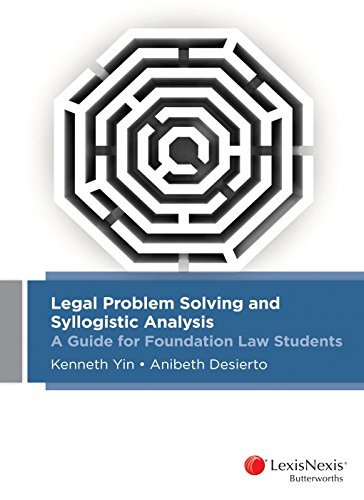Legal Problem Solving and Syllogistic Analysis
By Yi Li Alyssa Tjioe
Published on February 7, 2017

It is a truth universally acknowledged, that the average law student is going to hit a couple of hundred roadblocks on the way to graduation. One of those is the dreaded essay; whereby one might spend a month working on a set question just to receive mediocre grades for ‘lacking analysis’.
Kenneth Yin and Anibeth Desierto’s ‘Legal Problem Solving and Syllogistic Analysis’ is particularly useful at times like these. From a glance at the table of contents, it is clear that the authors have a comprehensive understanding of the problems besetting students. There is a clear, progressive structure of legal analysis from deciphering questions on legal research to constructing the answers, laid out in steps that are easy to follow. This provides students with a framework of necessary skills which might enable them to analyse problems in a critical manner.
An immensely helpful introduction to structured problem analysis, Yin and Desierto explain and examine syllogism – a ‘statement of logical relationship’ which consists of the major premise, the minor premise and the conclusion, linking it to the IRAC format which students are frequently required to use. The sub title is ‘A Guide for Foundation Law Students’; however, it is really a guide for students in general. I found that the explanation of IRAC through syllogism made it easier to understand the parameters of the question from the start. While it will require practice, the explanations and examples are clear and consistent, which makes it easy to understand and capable of application to any subject.
This book would be a very handy guide for most students, as it might function as reference before an examination, and a diagnostic tool for review afterwards. For example, using the section devoted to logical fallacies, students would certainly find it easier to work more efficiently through the revision and editing process. With contextual examples and step-by-step explanations, selecting and correcting logical fallacies becomes much simpler. The clear links to preceding and following concepts also enable students to understand how each skill is linked and applied together; a result that Yin and Desierto have consciously worked towards and succeeded in achieving.
What truly differentiates this book from others, however, is the clear emphasis on pedagogy – this is a book that has been crafted to support learning from the very start. Desierto’s expertise and Yin’s experience shine through, as the reader is never left in doubt, with clear guidance through the thinking process. There are also appropriate breaks in the reading material and problem questions for the reader to test their understanding of syllogism, working through several levels of an example. The reader completes each chapter with a deeper understanding of logical analysis and confidence to apply that knowledge to their own work. Furthermore, Yin and Desierto have created online resources to supplement teaching, covering numerous case studies, albeit primarily focused on contract law.
The online resources helpfully complement each chapter of the book, directed towards lecturers and students ready to advance to the next step of syllogistic analysis. This draws more heavily on Yin’s experience as a corporate lawyer, and extends such analysis to more complex reading, such as judgments from superior courts. Clearly, this guidebook considers not just the law student at the start of their professional journey, but takes into account how such analysis might be used throughout a legal career. For professors, the authors include methods of teaching and a highly informed debate on the role of syllogism in legal reasoning. Whilst this is not yet available, judging from the accessible content, it would certainly help in lesson-planning for foundations of law or researching legal topics. Students themselves can also utilise these chapters during self-study. I certainly wish that this book had been available when I needed it!
Librarians and students can order the book from the online LexisNexis store and I recommend that they do.
The Author

Yi Li Alyssa Tjioe was an Associate Editor with the international law magazine, The New Jurist. An undergraduate at the University of Leeds, Alyssa is an aspiring lawyer. She is currently interested in researching arbitration law, international trade law and environment sustainability.


